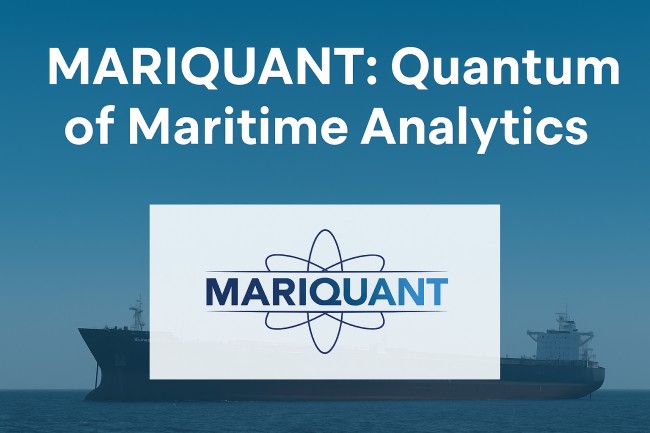Mariquant: Quantum of Maritime Analytics

The maritime industry has always been the backbone of global trade, enabling the flow of commodities, raw materials, and finished goods across continents. In recent years, the shipping sector has been facing pressure to improve efficiency, reduce costs, and embrace digital transformation. Against this backdrop, Mariquant emerged as a forward-thinking company with a mission to unlock the untapped value of maritime data through predictive and data-driven analytics.
Founded in 2017, Mariquant established itself as a specialist in maritime analytics with a focus on creating advanced solutions that address some of the industry’s most pressing challenges. Although a small company in terms of headcount, Mariquant’s ambitions and expertise placed it at the cutting edge of innovation within the maritime sector.
The Vision Behind Mariquant
At its core, Mariquant was created with the belief that there is immense potential in data-driven insights for shipping and logistics. Traditional methods of decision-making in maritime operations have often been slow, manual, and dependent on fragmented information. Mariquant set out to change that by introducing machine learning–enhanced analytics that can process large volumes of maritime data quickly and accurately.
By building a platform capable of providing timely and scalable insights, the company empowered stakeholders to make faster and better-informed commercial decisions. Whether calculating vessel arrival times or predicting port congestion, Mariquant sought to equip decision-makers with tools that could reduce uncertainty and improve efficiency across global shipping networks.
Headquarters and Company Profile
Mariquant was headquartered in Figueira da Foz, Portugal, a coastal city that has long been associated with shipping and maritime activities. With a team of just 2–10 employees, the company operated more like a highly specialised think tank, focusing on quality and innovation rather than scale.
Despite its compact size, Mariquant combined expertise from diverse fields including physical commodities, maritime logistics, financial services, and cutting-edge technology. This multidisciplinary foundation enabled the company to craft analytics tools that addressed real-world problems in a practical, commercially relevant manner.
Specialties of Mariquant
The company described itself as a leader in predictive analytics and maritime analytics, with a solutions toolbox tailored to the needs of shipping operators, charterers, and commodity traders. Among its key specialities were:
Predictive Analytics for Vessel ETAs
One of Mariquant’s most valuable contributions was its system for calculating estimated times of arrival (ETAs) for vessels in transit. Shipping schedules are notoriously difficult to predict, influenced by factors such as weather, port congestion, and vessel performance. Mariquant’s automated analytics system improved accuracy by using machine learning models to process historical and real-time data, allowing companies to plan operations with far greater confidence.
Port Congestion and Turnaround Reporting
Another cornerstone of the Mariquant analytics toolbox was its port congestion model. The company developed an initial implementation of a predictive port waiting system that enabled stakeholders to understand how long vessels might remain at anchor before gaining entry. By offering insights into turnaround times, Mariquant provided a critical advantage to shipowners and cargo owners who needed to manage costs and schedules efficiently.
Cargo Flow Modelling for Oil and Tanker Markets
The oil and product tanker sector was another area of focus. Mariquant’s cargo flow models tracked and analysed global tanker movements, enabling clients to understand supply-demand dynamics in the energy trade. These insights proved valuable for traders and logistics managers, who could optimise their operations by anticipating cargo flows more accurately.
The Technology Behind the Solutions
Mariquant’s innovation lay in its ability to combine automation with advanced data science. Its solutions were powered by machine learning algorithms capable of processing vast quantities of data from multiple sources, such as AIS (Automatic Identification System) signals, port data, and commodity flows.
By automating the entire analytics pipeline, the company delivered insights at the scale of individual cases without sacrificing accuracy or timeliness. This represented a significant leap forward from the manual data crunching and intuition-driven approaches that had long dominated the maritime world.
Website and Online Presence
The company operated through its official website, mariquant.com, which served as the hub for information about its solutions and expertise. While the website at present may not be active, it played a key role in presenting the company’s services to potential clients and collaborators during its years of activity.
In addition to the website, Mariquant maintained a modest but professional presence on business networks such as LinkedIn. This allowed the company to connect with industry professionals and showcase its unique capabilities in maritime analytics.
Founded with Expertise and Innovation
Mariquant was founded in 2017, a period when digitalisation and artificial intelligence were starting to transform industries at a rapid pace. The company’s founders were seasoned professionals with experience across physical commodities, logistics, finance, and technology. This unique blend of expertise meant they were not only technically capable but also understood the commercial realities of shipping and trade.
By bridging the gap between theory and practice, Mariquant offered tools that were relevant, usable, and effective in solving day-to-day maritime challenges.
Why Mariquant Mattered to the Maritime Industry
The maritime industry has historically been slow to embrace digital transformation. Many processes were paper-based or reliant on outdated systems well into the twenty-first century. Mariquant’s work highlighted the enormous benefits that could be achieved by integrating predictive analytics into everyday operations.
Improving Operational Efficiency
Through accurate ETAs and congestion predictions, shipping companies could minimise delays, optimise fuel usage, and better coordinate supply chains.
Reducing Costs
Predictive insights helped reduce demurrage charges, improve scheduling, and avoid costly disruptions.
Enhancing Decision-Making
Data-driven analytics provided stakeholders with clarity in a highly uncertain environment, enabling better strategic and commercial choices.
Challenges and Uncertainties
Despite its innovative approach, Mariquant faced the same challenges that confront many niche technology firms. Operating with a small team and targeting a highly specialised market limited its growth potential. Moreover, the complexities of integrating predictive analytics into traditional maritime workflows may have slowed broader adoption.
Another uncertainty lies in the company’s current status. With its website inactive, it is unclear whether Mariquant continues to operate or has paused activities. Regardless of its present situation, the company’s contribution to maritime analytics remains notable as part of the broader push toward digitalisation in shipping.
Conclusion
Mariquant embodied the spirit of innovation at the intersection of maritime operations and advanced data analytics. Founded in 2017 and based in Portugal, the company specialised in predictive analytics solutions that tackled challenges such as vessel arrival times, port congestion, and tanker cargo flows.
Though a small team, Mariquant’s impact was amplified by its use of machine learning and automation, proving that even compact companies can bring transformative change to traditional industries. Its focus on building a comprehensive solution toolbox positioned it as a pioneer in the application of analytics to the shipping sector.
Whether active today or not, Mariquant’s work serves as a blueprint for how maritime companies can harness the power of data to drive efficiency, reduce costs, and make smarter decisions. The quantum leap that Mariquant envisioned for the maritime industry is one that continues to inspire innovation across global shipping and logistics.



